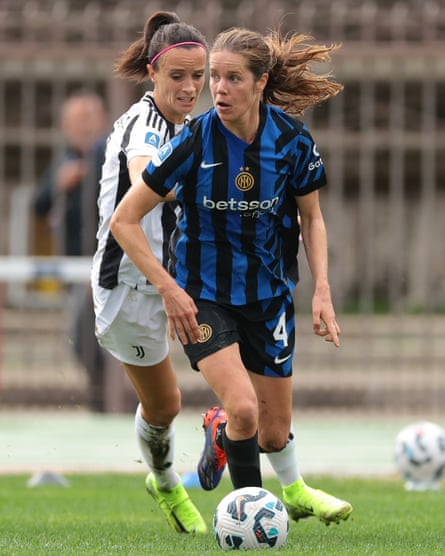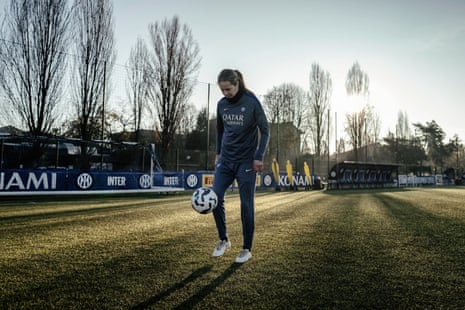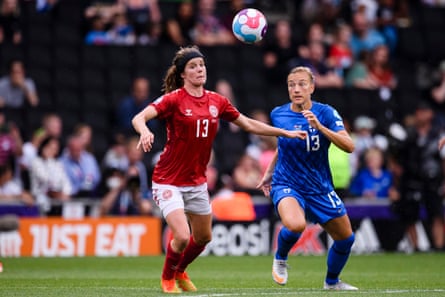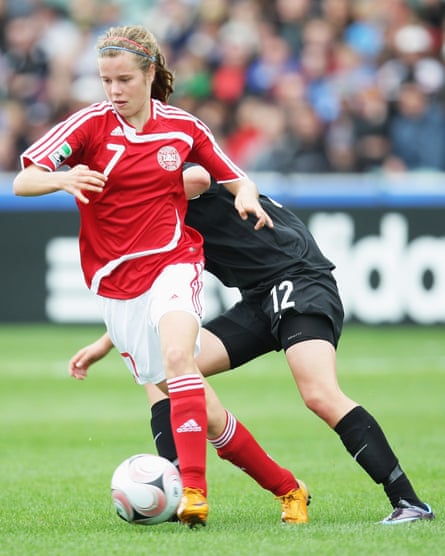The Guardian Footballer of the Year is an award given to a player who has done something remarkable, whether by overcoming adversity, helping others or setting a sporting example by acting with exceptional honesty.
If the football had not worked out, perhaps Sofie Junge Pedersen could have run away to the circus. When her after-school youth club in Aarhus put on its annual week of performances there was one challenge that struck her in particular: the chance to juggle with fire torches and mock knives. “It was quite serious,” she laughs. “We practised a lot beforehand and I thought it would be fun. I just wanted to be the best.” So it proved and there is no evidence that anyone has beaten the time she set, aged 13, for keeping the two airborne simultaneously.
Maybe it serves as a metaphor for how the adult Pedersen has made her name. She has a trophy cabinet many can only dream of, including four Scudetti and a Danish league title. With a fair wind at Euro 2025 she could win her 100th international cap. But she is all the more extraordinary because of the work that has run alongside those feats. Her efforts standing up for the environment and human rights, while working on a number of other humanitarian projects, have few parallels among elite sportspeople.
“It really drives me,” she says early on a sun-dappled morning at Interello, where Inter’s academy and women’s players train. “We have a responsibility to try and do at least a little bit for other people.” It is a duty she takes seriously. Token gestures are simply not enough for Pedersen and that, ultimately, is why she has been named the Guardian’s Footballer of the Year for 2024.

The most recent example could hardly be more topical. We meet a few hours before Saudi Arabia’s bid for the 2034 World Cup is passed without so much as a vote. The timing may be coincidental but the symbolism is clear. When Fifa signed a major sponsorship deal with the Saudi state oil company, Aramco, in April it was clear to Pedersen that silence was no option. Along with the Netherlands international Tessel Middag and New Zealand’s Katie Rood, she began a campaign that resulted in an open letter to Fifa describing the arrangement as “a stomach punch to the women’s game” and urging them to cut ties with Aramco.
It was signed by 135 female players and crowned a process that involved meetings with, among others, Amnesty International and Human Rights Watch. Lina al-Hathloul, a prominent Saudi human rights activist, was heavily consulted. The three footballers wanted to get their facts right before trying to bring others with them. They instinctively recoiled at both Aramco’s environmental record and the horrific levels of oppression inflicted by the Saudi state, but their arguments had to be clear.
Once the message had been honed, players in their circles were sent fact sheets and links to a webinar discussing the issues. “Fifa might as well pour oil on the pitch and set it alight,” read the letter, which also pointed out the dire situations faced by many women and LGBTQ+ individuals in Saudi Arabia. The uptake was, once their colleagues had tuned in, overwhelming.
“It’s a huge number, from 27 different countries,” Pedersen says. “It shows it’s important for us to stand up for human rights and fight against discrimination of any kind.
“It’s important that the players joining these initiatives know what is happening. We’ve spent a lot of time trying to provide the right information so that everyone feels aware of the situation before signing everything. I think some of the things I’ve been advocating for are new for many people, but once they know what is going on I feel their engagement.”
Pedersen was already used to meeting a moment like this; to creating a football-led movement that recognised the sport’s need to confront matters of existential gravity. Last year she spearheaded a group of 44 players taking action to offset flights around the Women’s World Cup in Australia and New Zealand. They made donations to a number of climate resilience, carbon offsetting and adaptation initiatives. Climate change has preoccupied Pedersen for more than 15 years and sitting idle will not do.
She is grateful that Inter have never flown to a game in her year and a half there, although it is not so simple when travelling with Denmark. Taking a flight always brings minor reckonings with the self. “I feel bad,” she says of her emotions when stepping on a plane. “But I also know bad feelings alone don’t help anything. I pay compensation for all my flights and I think it’s something, although it doesn’t solve the problem that flights are polluting a lot. We wanted to send a message.”
It was Cop15 in 2009, held in Copenhagen, that largely set Pedersen’s course. She was a richly promising 17-year-old midfielder at IK Skovbakken but, that winter, travelled on holiday to Kenya and Tanzania with her parents. “I feel privileged that I could go,” she says. “But I also got to see that people are not living in the same conditions as me. We were talking to people there about how they were struggling with climate change and at the same time following Cop15 at home, so that’s when the climate awareness really started for me.
“I realised that this is a serious problem, a crisis. From then on I started to read more about it, and to really listen when it was on the news, and just got very scared. It’s a catastrophe we are causing. And I can’t stand the fact that we, in the rich part of the world, are responsible for it when it hits vulnerable people and countries the most. We must be at the front of fighting climate change and helping those people. Everyone will be hit by it, and that includes football.”
If that was the lightbulb moment, the current had been running since early childhood. Pedersen was part of a big family in Aarhus, raised with three siblings and steeped in an environment where political discussion was never off the table. It sounds like the classic Scandinavian social democratic upbringing, heavily influenced by parents who encouraged debate. “We pay tax with joy” was an early mantra instilled by her mother, a headteacher. Her football talent was clear from an early age, and readily nurtured amid an environment far better catered to girls’ sport than most in the late 1990s, but other interests took hold simultaneously.

“From a very young age I was watching the news, with my parents or alone,” she says. “I was really interested in society, especially international politics. I think I was aware pretty quickly that I was born in Denmark, one of the richest and most stable countries on the planet. It’s difficult to change the whole world, even if you really want to, but from early on I wanted to at least do something for someone.”
Nobody held back from giving their opinions. “At school you’re told to ask questions, to question the authorities. That’s a very important part of our culture. Questioning the status quo is important for us and maybe it’s something that makes people more aware.” She would create projects about topics like peace in the Middle East or problems in Africa; in high school there were heated discussions with classmates, boys in particular, when she mentioned voting for a left-leaning political party. “I don’t know if everyone thought that was a good idea,” she says, diplomatically.
after newsletter promotion
Coming through at the local club Skovbakken, Pedersen was part of a rich vintage that included her decorated Denmark teammates Pernille Harder and Nadia Nadim. The latter now plays nearby for Milan; three days before this interview she scored against Pedersen’s side in the first Milan derby to be held at San Siro. There must have been something in the water back home. “It was the best place I could be,” she says.
By her early 20s, spent with Fortuna Hjørring, it was clear she would prosper abroad. They won Denmark’s top flight in 2014, the captain Pedersen standing out, but experiences away from football helped drive her. Even back then, she spoke in interviews about hoping to work for an aid organisation upon retiring. While steering Hjørring to glory she would work once a month as a volunteer with the Danish refugee council: games and outings were organised that those less fortunate could enjoy with local people. “It was an eye opener to meet people from places like Afghanistan and Syria who had fled when very young,” she says. “That makes a mark, I think.”
Around the same time she became involved with Yopp, a community project in Ghana aimed at empowering girls and young women to play sport. Her club lent a hand; later on Juventus, where she won multiple editions of Serie A after spells at Rosengård, Levante and Vittsjö, sponsored one of its football leagues. Pedersen remains heavily involved and has returned multiple times, also working in Zambia on a project run by Common Goal.

It may seem a marvel, given these are far from the only causes Pedersen supports, that her career has hardly wavered. But she would rather it was not seen that way: such intense involvement in global issues motivates her, she thinks, to sharpen a winner’s mentality in football. Then there is that theme of responsibility, to which she returns often. “There are an estimated 3.5 billion football fans in the world,” she says. “It means a lot to so many. As players we are also human beings, so I think we have a platform to speak up.”
Can top-level football ever fully reconcile its profit-driven hunger for global reach, and any more laudable intentions to become accessible for everyone, with the subsequent environmental impact? Finding a balance would seem the finest of high-wire acts. “We need to think about how football develops and its effect on the planet,” she says. “Flights have the biggest CO2 use in the industry if you calculate it, and I think we have to. I’ve called on Uefa to make some rules, suggesting no team can travel by plane if they can make the same journey by train within a certain number of hours. We need it, because we have to limit these flights. I see clubs often post online when they take the train, so they seem to know it’s a good thing.”
Uefa prefers to leave such matters to clubs’ discretion; it remains to be seen whether Pedersen’s suggestion has been noted. The same goes for the 135-strong representation to Fifa regarding Aramco, Saudi Arabia and their ever-strengthening, seemingly unilaterally sanctioned, grip on football’s future. Does she feel the letter – essentially the reason we are sitting here today – has been heard by those who need to?

Before that particular question can be answered, a listening press officer cuts in. Time is up: Pedersen must prepare for training and there will be no space even for a “yes” or “no”. This may be the moment to point out that, five days before the open letter was sent, Inter “formalised its commitment to strategic expansion in Saudi Arabia” with an agreement that involves enhancing its brand presence and aiming to “contribute positively to the country’s future ambitions”. In these surroundings at least, the topic has run as far as it can. It is a reminder that, for all the good footballers can do, few near the game’s summit may nowadays avoid being inadvertently enmeshed in a web of wider interests.
That conclusion, though, is hardly of a piece with Pedersen’s attitude. Earlier in the conversation she is asked if, taking on such gargantuan subject matter, it can be hard to feel hope. She shakes her head. “If you don’t have hope, you’ll just sit back and not do anything. It’s difficult sometimes, but we have to be positive otherwise nothing will change. We have to keep hoping and put pressure on to change things, and to change ourselves also.”
Source: theguardian.com


















